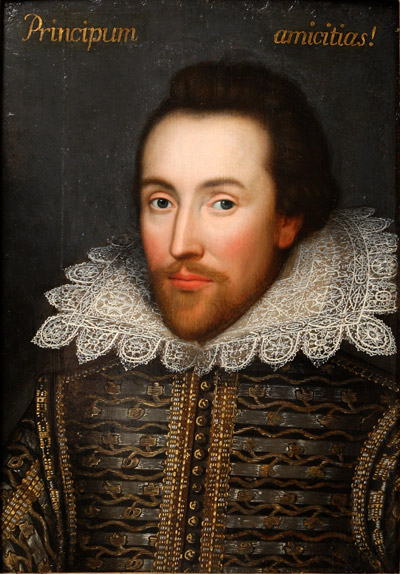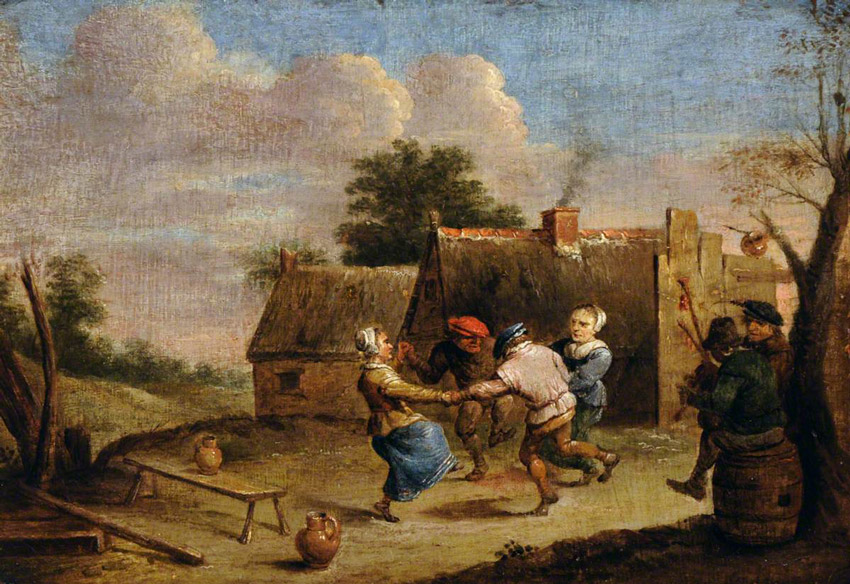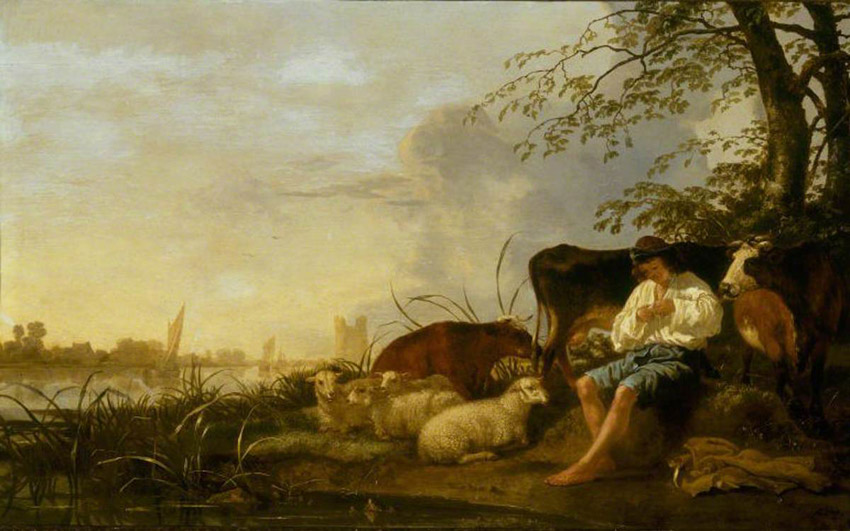Some Great Paxton Wills, 1608-1699
These documents date from a time when the affairs of ordinary people were generally not recorded. They can sometimes give a fascinating glimpse into what life was like by reading between the lines.
Take for instance the will of John Pische from the 1540's, a man who lived in a large property with a number of servants approximately where Brookside is today. Amongst other bequests, he left 6 shillings and 8 pence to build the first bridge over willow or sallow brook that crosses under the High Street next to Dovecoat Lane.
Prior to this, there would have been a shallow ford and stepping stones at the bottom of Paxton Hill to cross the brook. Now for the first time villagers, travellers and their animals could cross a (presumably) wooden bridge instead of wading through the forded stream or making their way across on stepping stones.
 The
1600's, Turbulent Times
The
1600's, Turbulent Times
These wills date from 1608 to 1699. To put this time into some kind of context, it was the era of Shakespeare, Guy Fawkes, the King James Bible, Samuel Pepys's diary, Isaac Newton, the English Civil War, the plague and the Great Fire of London. It was also during this period that the first coffee houses and tea arrived in England, coffee came first, tea was initially an unusual alternative in coffee houses.
Monarchs and rulers: The century opened with Elizabeth the first who died in 1603, she was followed by James I, Charles I (executed 1649), Oliver Cromwell and Richard Cromwell (rulers but not monarchs), Charles II, James II, Mary II, and William III.
The wills are all available as scans of the original documents which are almost illegible to modern eyes, though were generously transcribed, including translations from Latin by Rachel Osborne of Great Paxton and her parents during the covid lockdown of early 2020. Links to individual will pages to the right.
Short portions of a number of wills have been selected to give an overall impression:

David Teniers - Peasants Dancing,
1600's
The Will of Elizabeth Bellye - Gentlewoman and Wife of Great Paxton d.1608
In the name of God amen
The three and twentieth day of Februaris anno domini one thousand six hundred and seaven I Elizabeth Bellye of Much Paxton in the countie of Hunt. gentlewoman and wife unto Mr John Bellye of Much Paxton aforesaid Doctor of the Laws being weake and sicke in body and yet of perfect mynde and memory doe willinglie and with a free harte render again into the hands of my Lord God and creator, my spiritte which he of his fatherlie goodness gave unto me when he fashioned me firste in my mother’s wombe, making me a living and a reasonable creature nothing doubting, but of his infinite mercies set further in the precious blood of his dearlie beloved sonne Jesus Christ our only saviour and redeemer, he will receive my soule into his glorie and place it in the company of the heavenlie Aingelles and blessed saintes...
This is a common way that the wills are started. Note the village name given as "Much Paxton".
First I give and bequeath unto … the longe needleworke Quisshion that Bridgitt my servant is now in working.
I give … my Tuffe Taffatie gown and my five velvet kyrtles which are at Bugden and a peece of scarlett which is at Budgen if my husband doth not use it.
I will that my Daughter shall have the choyce of one of my three silke cloakes, three hoodes and two night railes.
What seem today to be quite ordinary items are specifically
left to people. Also, the fact that a needlework cushion (quisshion)
is now being worked upon indicates that the will is written
shortly before the expected death.
Bugden - The name for Buckden at the time.
Kyrtle - A long garment with long sleeves, worn with a belt. Men wore kyrtles (or kirtles) that were shorter, just above the knees usually with another garment covering the legs, women's kyrtles were often floor-length dresses.
Note the variable spellings, quite common for the time.
[In Latin] - The above written will was proved at London before the venerable [names of witnesses]
The will was proved in London on the 20th of June 1608 following Elizabeth Bellye's death having been written on the 23rd of February 1607.

Aelbert Cuyp - Peasant Boy with Cattle
and Sheep - 1600's
Robert Archdeacon d. 1614:
First I bequeath my soule unto the hands of Almightie God my maker and creator hopeing to be saved by the merritte death and passion of Jesus Christ his only sonne my lord and saviour, and my body to the earth from whence it came.
There is usually a commendation to God to accept the
soul, Robert Archdeacon goes a step further and leaves God his
soul in the will, God would of course be at the reading.
I give and bequeath to the repaire of the church and bells of Great Paxton tenn shillings.
I give and bequeath unto the poore people of Great Paxton twelve shillings.
I give and bequeath unto the repayer of the chantry of Great Paxton tenn shillings.
I give and bequeath unto Ellyn Steele the elder a peece of gould of eleven shillings.
I give and bequeath unto John Steele friend one peece of gould of tenn shillings.
I give and bequeath unto every one of my godchildren twelve pence a peece.
Charitable giving is common, often as much or more being given to the church and its upkeep as to the poor. Financial support for the poor of the parish came from those living in the parish, there were no central funds.
Ellen Steele (widow) d. 1617:
I give and bequeath unto Francis Steele my sonne tenn pounds of current English money to be payd unto hym at the age of XXI [twenty one] yeares.
[Several more similar.]
I give and bequeath unto Francis Steele my sonne my black cow and her calf.
I give unto Ellyn Steele my daughter my browne cow and her calf.
I give and bequeath unto William Steele and Thomas Steele my two youngest sonnes my black pyed cow the sayd cow to be sold and the money to be equally devyded between them two.
I give to Francis Steele my sonne my ewe and her lambe and the wether sharhogg.
I give unto William my sonne my lambhogg.
I give to Thomas Steele the other ewe and lambe.
I give unto Francis my sonne the land or wheat on [Crose/Crope] Way, also I give hym the [ ] of fyelds in Bryer Hill for this crop.
I give unto Ellyn Steele and Thomas Steele an acre of field lying against the north brooke to be sown, plowed and narrowed with good and sufficient seed barley at the cost and charges of my executor.
I give unto William my sonne the wheat growing on the north back side .
I give unto William my sonne three sheets one to be a flaxen one, two pillows, a blanket and a pillowbeere.
To Thomas my sonne 1 boulster, a pillow and a pillowbeere.
Crops currently growing in the fields are being bequeathed indicating how close death is felt to be.
Pillowbeare - pillow case, specific items of bedding are often mentioned in wills of the time.
Wether – a castrated sheep
Shar – dialect for Shear
Sharhogg – a lamb after its first shearing
Inventory of Possessions of Nicholas Neave Labourer of Great Paxton d.1613:
A true inventarie of all & singuler the goodes & chattles creditts & debts of Nicholas Neave late of Great Paxton in the county of Huntington laborer deceased made valued & praysed the vijth (seventh) daie of Aprill 1613 by Thomas Atkinson clerke & vicar of greate Paxton John Steele, Robert Dickman & Edward [Denis] of Great Paxton as followeth
Presumably someone who died intestate (without making a will). An official inventory of belongings were made along with debts to be settled.
In the chamber:
A standing bedd, a flockbed [?] a blankett, 2 pillows, 2 boulsters - 12 shillings
All his Apparell - 10 shillings
In the Hall:
A theale table, 4 bowls w'th oth'r trash'y trashery, saucer, a beak'r, a pint pott - 23 shillings
Salts, 4 puther candlesticks
A mortar and a pestle
In the Yeard
A salting trough, w'th a cov[er], A payre of pincers - 6 shillings 8 pence
One old hovel w'th raft'rs, & all the fyerwood - 13 shillings 4 pence
all the lumb'r - 6 shillings 8 pence
All the muck(?) in the yeard - 2 shillings
3 old hooks of brass(?) - 16 shillings
2 [milch?] beastes - £4 6s 8 pence
One hen & a cock - 9 pence
3 Roods of wheat & one of ottes - 16 shillings
The sum of all is - £24 8s 6d
Debts due to the sayd Testator
Thomas Vintner(?) doth owe him - 50 shillings
Debts the sayd testator oweth
To John Coulton of Sowthoe - £4
The list is more extensive than these representative items given here. I'm not sure the deceased would hev been very pleased with the description of some of his belongings as "w'th oth'r trash'y trashery", though may have been more pleased that all the muck in the yard was worth 2 shillings.
A rood is a quarter of an acre.
Nicholas Neave - full inventory
The Will of John Kinge - Yeoman of Great Paxton d.1622:
I give and bequeath unto Elizabeth Kinge, my daughter my white backed heffer and the blacke bullock that were [Danses]
Hellen my daughter that bullock which I bought of Michell of Offord.
...unto every one of my daughters three cows a peece and my will and meaning is that my executrix shall breed up a bullock for Mary my daughter the next year after my decease.
...unto William Kinge and John Kinge, the two sonnes of my brother Abraham Kinge to eyther of them two of my best lambes a peece that be in [Coffen].
...unto every one of my godchildren an ewe lambe.
...unto Agnes Doodson my servant one ewe sheep.
...unto the poore people of Great Paxton and Toseland to every house twelve pence.
...to the repair of the canopy of Great Paxton six shillings to be bestowed when my friend Gilbert Longe shall appoint.
...unto the ringers three shillings four pence.
Thomas Fann Yeoman, d. 1655:
John Fann my eldest sonne a thousand pounds of lawfull English money to be paid him when he attains to the full age of one and twenty years.
William Fann my second sonne tenn pounds of lawfull English money to be paid him when he attains to the full age of one and twenty years.
Thomas Fann my third sonne forty pounds of lawfull English money to be paid him when he attains to the full age of one and twenty years.
...my three daughters, Mary Fann, Susan Fann and Dorothy Fann one hundred pounds a peece of good and lawfull money of England to be paid them when they shall severally attaine to the full age of eighteene years.
Seems to be a bit of family favouritism going on here!
Robert Throckmorton d. 1699:
Then I do appoint Mary my said wife as guardian for my said children during their minorities if she lives so long and continues a widow, but if she should happen to dye before or marry, then I do appoint my father in law Thomas Bromsall Esq and my uncle Edward Mason, Guardians for my children during their minorities and do desire them to take case of their education and bringing up.
Interestingly here, the children of Robert Throckmorton are not considered to be automatically under the guardianship of his wife after his death (they may of course not be her biological children) depending on her future marital status.
This will is particularly convoluted regarding the fate of the estate being tied up with sons and daughters who may or may not live past the age of 21 years, there is also another child on the way the sex of which is unknown and for whom things are different if they are male or female.
Common themes:
Small amounts of money usually to servants and the poor are stated in the smallest denominations, presumably to make it sound better, e.g. 12 pence rather than a shilling, 40 shillings rather than 2 pounds, whereas greater amounts left to family and friends is given in pounds.
Most wills leave some money to the poor and to the church, usually for upkeep and repair.
Money is generally given to sons for them to receive at 21 while money given to daughters is generally received on their marriage if before 21 or sometimes at 18.
The same names in the village crop up a number of times as witnesses or executors and then sometimes later their own wills appear.
Bedding crops up in almost every will as items given specifically, beds, pillows, pillowcases etc.
Names:
I like the sounds of old names, here's a few that appear in these wills.
Albion Throgmorton
Mr Obadiah Coysh
Agnes Doodson
"Divers others and goodwife Bull and goodwife Lennet"
"...my ould servant Ould Mogg"
Completed Transcriptions:
1608 - Will of Elizabeth
Bellye, Gentlewoman and Wife of Great Paxton
1609 - Will of Doctor John
Belley, Doctor of the Civil Law of Great Paxton
1614 - Will of Robert
Archdeacon, Yeoman of Great Paxton
1613
- Inventory of Possessions of Nicholas Neave
1617 - Will of Ellen Steele
1622 - Will of John Kinge,
Yeoman of Great Paxton
1650 - Will of Gilbert
Longe, Gentleman of Great Paxton
1650 - Will of Lawrence
Sandford
1655 - Will
of Thomas Fann, Yeoman of Great Paxton
1656 - Will of Elizabeth
King, Widow of Great Paxton
1662 - Will of Mathew
Hewson, Master of Arts of Great Paxton
1699 - Will of Robert
Throckmorton of Great Paxton
1745 - Will of Patrick Smith, Clerk of Great Paxton
Click on the link to open the document or right click and save to your computer to view offline.
1086 - Domesday-book - 1
1086 - Domesday-book - 2
1275-1300 - Petitioners People of the two parts of the village of Great Paxton
1906 - Webb, Walter Stephen. Official Number SS102621 - seamen's service

